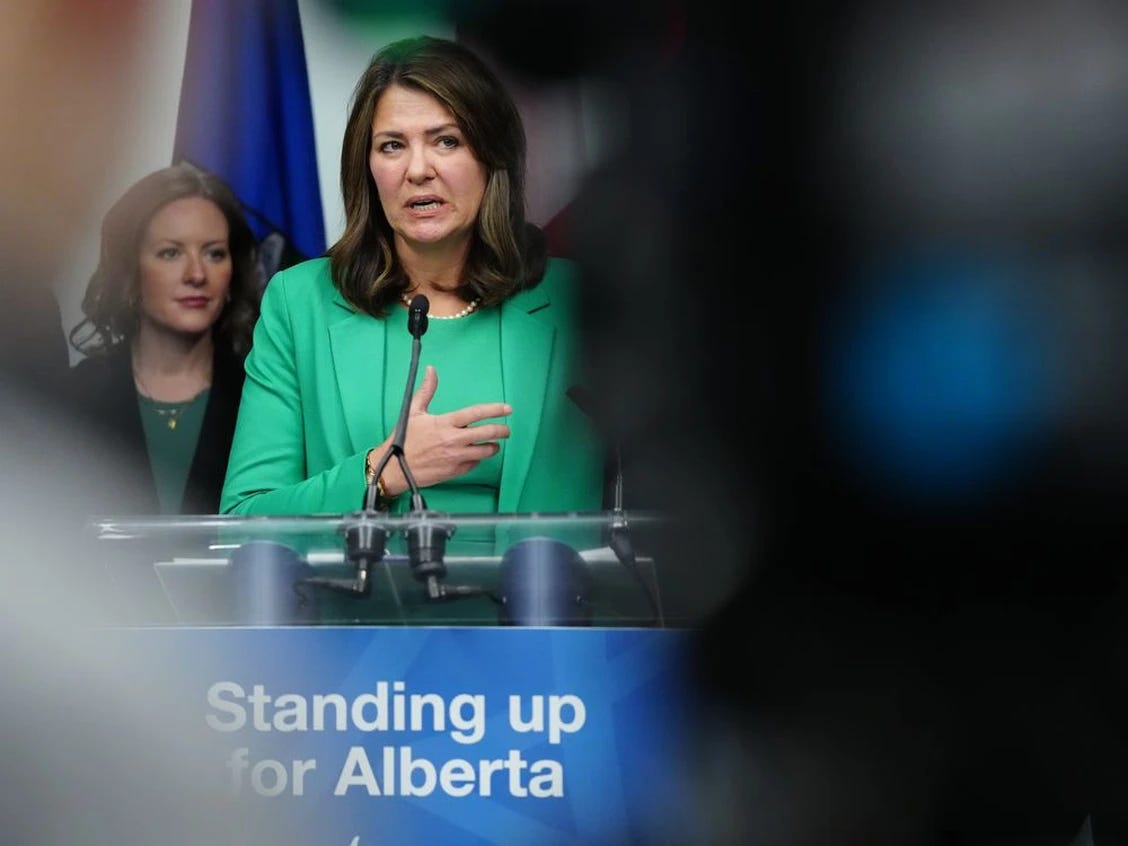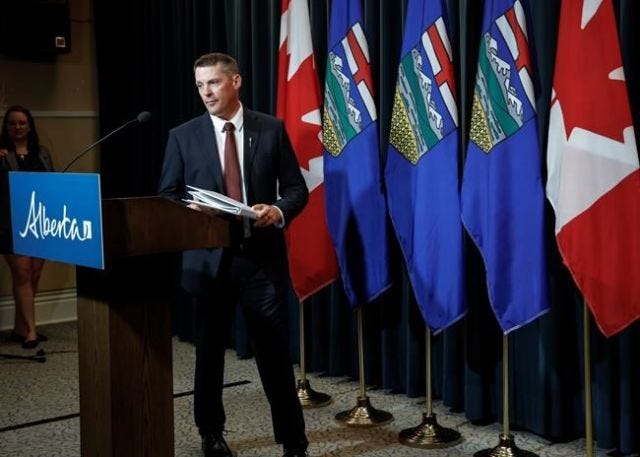Alberta Rejects Federal Emissions Cap as Unrealistic, Ineffective, and Intolerable
The province of Alberta, along with two business groups, has responded to a proposed federal emissions cap, describing it as unrealistic, ineffective, and intolerable. The federal plan aims to cap emissions from the oilsands at 100 megatonnes, allowing flexibility through the purchase of credits by individual companies. Alberta, the Canadian Association of Petroleum Producers, and the Business Council of Alberta argue that the cap would undermine the province's existing efforts to reduce emissions and suggest that alternative policies, such as a transparent carbon price, would be more effective. Economists highlight concerns about the economic efficiency of targeting one sector and propose a broad-based carbon tax instead. Despite Alberta's constitutional arguments, experts suggest they are weaker than their opposition to the emissions cap. Federal Environment Minister Steven Guilbeault emphasizes the necessity of capping pollution for the long-term competitiveness of the oil and gas sector in a global economy moving towards net-zero emissions by 2050.
Canada Mulls Overhaul of Clean Electricity Rules Amidst Industry Opposition and Provincial Disputes
The federal government in Canada is considering significant changes to its draft clean electricity regulations (CER) aimed at achieving a net-zero electricity grid by 2035. Environment Minister Steven Guilbeault, acknowledging feedback, announced 10 potential changes, including an annual emissions limit based on generation unit size, the elimination of peaker provisions, and allowing the use of offsets for exceeding emissions limits. While individual Canadians support the regulations, industry and some provincial governments, notably Alberta, oppose them citing concerns about practicality, cost, and reliability. The government will continue consultations until March 15, with finalized regulations expected later this year.
Canada Energy Regulator Approves Trans Mountain Pipeline Variance with Conditions
The Canada Energy Regulator has approved Trans Mountain Corp.'s revised pipeline variance application, citing public interest due to new inspection commitments and demonstrated quality management processes from Trans Mountain. The regulator initially denied the request but reconsidered after Trans Mountain warned of potential delays of up to two years without the proposed changes. Despite facing difficulties in drilling through hard rock in British Columbia, the regulator's approval comes with four conditions. Trans Mountain has recently encountered additional construction challenges, leading to a revised expected in-service date from the first to the second quarter of the current year.
Alberta Awaits Fall Verdict on Pension Plan: Federal Assessment to Shape Province's Financial Destiny
Albertans will have to wait until the fall for the federal government's assessment of what Alberta should receive if the province withdraws from the Canada Pension Plan (CPP). Alberta Finance Minister Nate Horner revealed that the chief actuary plans to form a panel in the spring to explore the province's entitlement, with the final calculation expected in the fall. Premier Danielle Smith's government advocates for a provincially run pension plan, citing Alberta's strong financial position and young workforce. A report claims Alberta is owed 53% of the entire CPP, while critics argue it is an overestimation. The government engagement panel indicates a mixed public response, with half supporting the CPP and a quarter favoring Alberta's independent plan. A provincewide referendum would be required to ratify any decision to leave the CPP, and the government is committed to waiting for the chief actuary's assessment to provide information for an informed decision.
Alberta Law Professors Challenge Premier's Transgender Policies, Citing Charter Violations
A group of three dozen Alberta law professors, legal researchers, and staff from the University of Alberta and University of Calgary faculties of law have penned an open letter to Premier Danielle Smith. The letter calls for a reversal of the province's upcoming transgender policies, asserting that these policies violate multiple sections of the Canadian Charter of Rights and Freedoms. The concerns outlined in the six-page letter include bans on hormone therapy for children aged 15 and under, restrictions on sports participation for transgender athletes, an opt-in system for sexual education, and parental consent requirements for altering the name or pronouns of children under 15. The signatories argue that these measures will harm two-spirit, trans, and gender-diverse children, impacting their education, healthcare access, and recreational opportunities. They contend that such restrictions violate the rights of these youth, including freedom of expression, the right to life, liberty, and security of person, protection from cruel and unusual treatment, and equality rights. The Premier's office responded, stating that the government will develop legislation with the best interests of the child in mind. The letter also urges against using the notwithstanding clause to insulate the policies from legal challenges, expressing concerns about targeting a vulnerable minority group by overriding the rights of trans youth.
Putin's Space Gambit: Pentagon Raises Alarm on Russia's Alleged Nuclear Weapons in Orbit
A Pentagon insider, Mike Hewitt, has expressed concern about Russia allegedly acquiring space-based nuclear weapons, emphasizing the need to take the claim seriously. Hewitt suggests that this development aligns with President Putin's strategy of asymmetric warfare, particularly in the context of tensions with the West and the situation in Ukraine. The US intelligence and members of Congress are treating these reports seriously. House Intelligence Committee Chair Mike Turner urged President Biden to address this perceived national security threat, believed to involve putting nuclear weapons into space to target satellites. The Kremlin has dismissed these accusations as a "malicious fabrication" by the White House, accusing them of seeking approval for more aid to Ukraine.
Train Derailment Near Revelstoke: Two Crew Members Injured in Collision, Cleanup Underway
Two crew members were injured in a train derailment east of Revelstoke. Canadian Pacific Kansas City reported that the derailment occurred when a moving train collided with the rear of a stopped train. Four locomotives and four grain-carrying cars were derailed. The injured crew members were taken to a local hospital with non-life-threatening injuries. One has been released, and there were no other injuries. CPKC crews are on-site for cleanup, and a fire on one of the locomotives has been extinguished. The cause of the derailment is under investigation.
Revelstoke Fire Rescue Services responded to a fire at the crash site but did not attend as it was outside city limits. The fire chief confirmed the fire, and CPKC acknowledged it, but details are limited. Initially, there were concerns about entrapment, but it was later confirmed that no one was trapped. The crash occurred near Greely Road, approximately nine kilometers east of Revelstoke along Highway 1. Further updates will be provided as more information becomes available.










